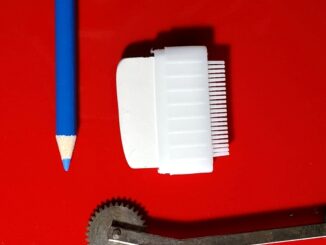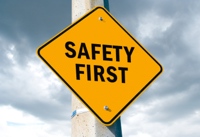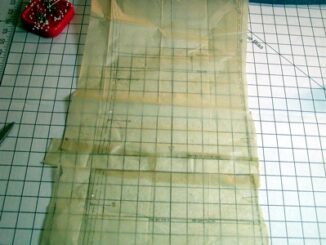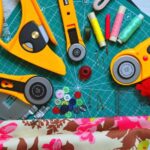 Anyone, including the beginner, needs to have a stocked sewing kit. You don’t need to spend an arm and a leg, and in fact, some of the items you need for your kit will probably already exist in your home!
Anyone, including the beginner, needs to have a stocked sewing kit. You don’t need to spend an arm and a leg, and in fact, some of the items you need for your kit will probably already exist in your home!
The following items should be present in any sewing kit. These are the absolute essentials. Over time, you will be able to decide what you need more of (if anything) and what can go away but overall, these are the most important items.
- Thread – the two essentials are black and white. If you want to have more colors available (for example, to replace a lost button) but don’t want to buy entire spools, you can purchase a traveler’s sewing kit which will have a card full of various colors. It’s not enough to sew a shirt, but it will be enough to make a quick repair.
- Needles –
- For hand sewing and simple repairs: I recommend buying a card of Sharps in various lengths and sizes.
- Also, be sure you stock needles for your sewing machine. One is NOT enough! Keep in mind that particularly sewing machine needles come in various sizes. What works for a pair of denim pants will not work for delicate fabrics. Try to keep a few different sizes available so you don’t have to do any last minute runs to the fabric store to get a project underway.
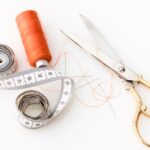
- Scissors – You don’t need to spend $30 (or more) on a pair of good scissors. A set from your local office supply will do, and it’s possible you even have a sharp pair laying around in your home. But once you find that your scissors are beginning to tear or pull at your fabric, it’s time to get a replacement or get your scissors sharpened. I recommend a long pair for cutting fabric and a short pair for trimming threads.
- Pins – Depending on the type of projects you plan to do, consider the options for your pins. Dressmaker pins tend to be shorter and finer, and are ideal for most apparel fabrics. The larger quilting pins are good for quilting (obviously) but also are good for heavier fabrics like denim, upholstery, and vinyl. I recommend getting glass head pins whenever possible. Plastic heads melt when touched by an iron, and flat heads are sometimes hard to find until you step on them. Ouch!
- Pin Cushions and Magnetic Pin Caddies – This is a personal preference thing. I was once a major advocate for pin cushions only, but then I was able to make use of a magnetic pin cushion and my world changed. Magnetic pin cushions have one or two large magnets inside them, usually with a plastic outer casing, that simply “grab” your pins. The downfall to these is sometimes you get pricked by the needle when you attempt to pick one up. The upside is if you drop your pins, just swipe the pin cushion over the area and usually they’ll all jump to the pin cushion. Still, there’s something to be said for a traditional stuff pin cushion, and they come in a wide variety of styles to suit any personality!
- Tape Measure – This is pretty self explanatory. Tape measures are useful for all sorts of things!
- Seam Gauge – Seam gauges help with the placement of buttons, when you are ironing back a seam allowance, hemming an item; any number of functions.
- Seam Ripper – I hate to admit it, but this is definitely a must-have. We never plan to mess up, but when we do, the seam ripper is a very helpful tool!
- Buttons – Simple shirt buttons for repairs. Many times you buy a dress shirt and it will come with a miniature bag with one or two replacement buttons. These should be “filed” into your sewing kit! Over time, you may acquire so many buttons that they overload your kit. This is where a used (but clean) peanut butter jar or tin with a lid come in handy.
Other items that are helpful to have around:
- Fray Check – this is a great product, particularly if you’re sewing button holes. After you stitch the hole, but before you cut the slit, run some fray check on the fabric. It will help prevent the buttonhole from ever fraying, and will also reinforce it a little bit.
- Patches – iron on and sew on
- Thimble – I recommend the leather kind, not the metal kind.
- Hooks and Eyes – these are important fasteners if you’re sewing apparel.
- Needle Threader

